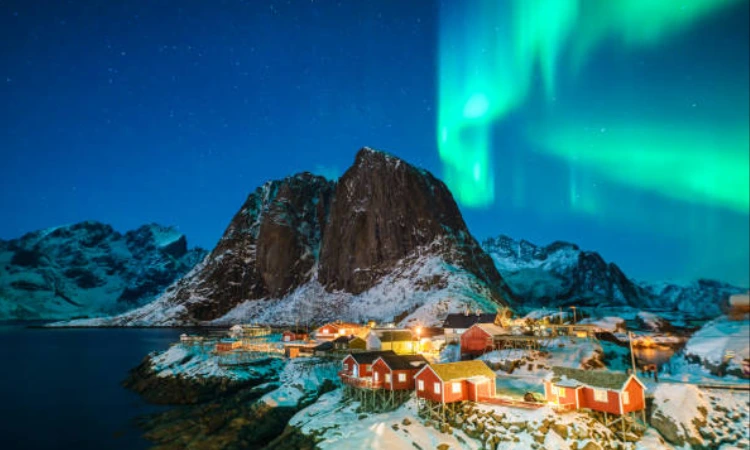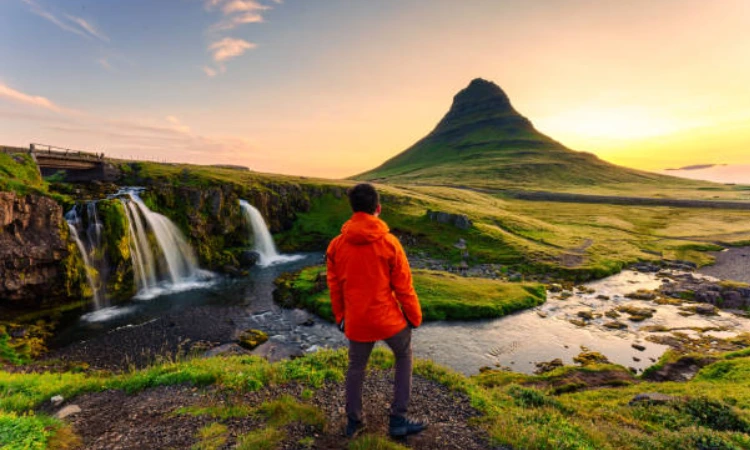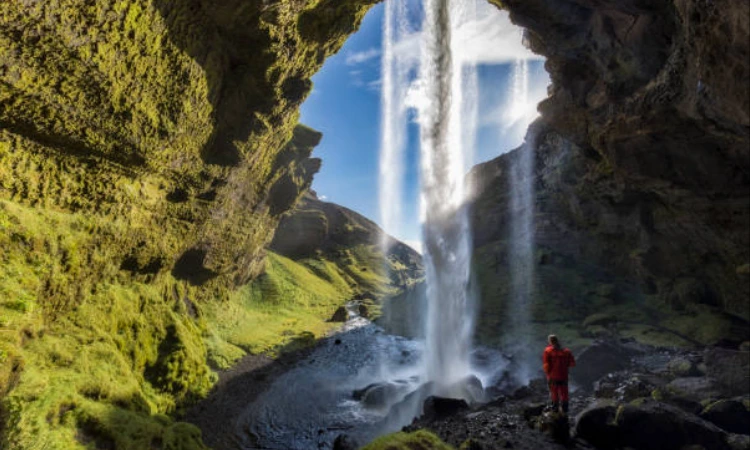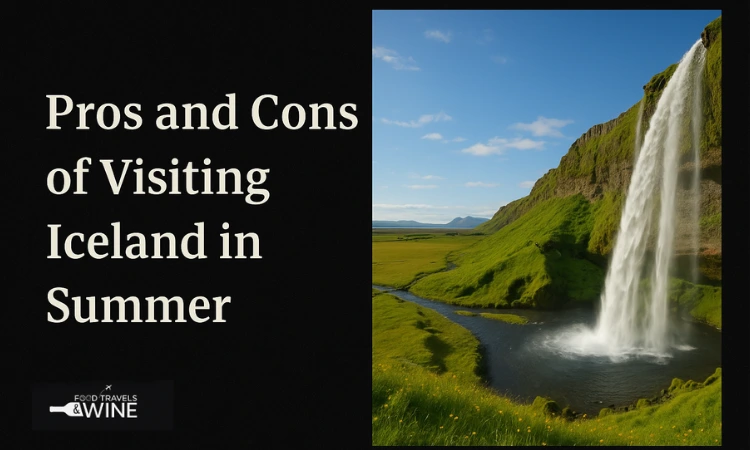Is Iceland in summer worth it? The answer is a big yes — but it depends on what you expect.
A visit to Iceland in summer brings endless daylight, colorful landscapes, and amazing adventures. But it also comes with higher costs, busy tourist spots, and unpredictable weather.
In this blog, we’ll break down the real pros and cons of visiting Iceland in summer. You’ll get the full picture — from the magic of the Midnight Sun to the sudden summer rain showers.

The weather in Iceland in the summer is mild and refreshing, but don’t be fooled — it can change fast.
Traveling Iceland in summer means paying more for hotels and tours, but the breathtaking beauty often makes it worth it.
We’re here to give you an honest guide so you can plan your summer trip to Iceland wisely and make the most of every single moment!
Why Do People Love Visiting Iceland in Summer?
One of the biggest reasons travelers adore Iceland in summer is the Midnight Sun magic.
Due to the endless daylight in Iceland summer, you can explore the country around the clock! With up to 20–22 Iceland daylight hours in summer, your adventures never have to stop.

Another reason is the weather. Iceland’s summer temperatures are mild and pleasant, often ranging between 10°C to 15°C (50°F to 59°F).
It’s the perfect climate for hiking, sightseeing, and road-tripping without worrying about freezing winds. The weather in Iceland during the summer months is far more forgiving compared to the snowy winters.
Summer also opens up full access to both famous and remote places. Roads that are closed during winter finally become passable.
You can visit hidden waterfalls, remote fjords, and scenic highlands without any major barriers. No wonder many people say the best time to visit Iceland in summer is between June and August.
From warm hikes under the Midnight Sun to discovering secret corners of the island, summer offers freedom and beauty you can’t find at any other time of the year!
Pros and Cons of Visiting Iceland in Summer:

Pros of Visiting Iceland in Summer:
Iceland in summer offers an abundance of beauty, adventure, and unique experiences. From extended daylight hours to a variety of outdoor activities, it’s a destination that captures the hearts of travelers.

Let’s explore why summer is the best time to visit Iceland.
Experience the Midnight Sun
- Up to 24 hours of light!
During summer, Iceland experiences the magical phenomenon of the Midnight Sun, where the sun barely sets.
With up to 24 hours of daylight, the country offers endless opportunities for exploration.
Whether you’re hiking to a glacier or enjoying a quiet moment by a lake, best activities during Iceland’s Midnight Sun include long road trips, late-night walks, and photography under surreal light conditions.
Best Weather for Outdoor Activities
- Hiking, road trips, camping
The summer months bring mild temperatures and pleasant weather, perfect for outdoor adventures.
Iceland’s summer weather allows for hiking, camping, and scenic Iceland summer road trips through landscapes that are only accessible in warmer months.
The roads are open, and remote sites like volcanic craters and geothermal springs become inviting destinations.
Camping in Iceland summer offers an opportunity to sleep under the light of the Midnight Sun, a truly unique experience.
Wildlife Spotting Opportunities
- Puffins, whales, seals, reindeers
Iceland’s summer is the ideal time for wildlife in Iceland during summer. The summer months offer fantastic opportunities for puffin season in Iceland, as these adorable birds are abundant along the cliffs.
You can also spot whales, seals, and reindeers as they roam freely across the island’s varied landscapes.
Wildlife tours are a must-do for animal lovers, making it a summer trip that blends nature with adventure.
Full Access to Highlands and Westfjords
- Roads open, tours available
Summer opens up Iceland Highlands summer travel, making regions like the Highlands and Westfjords more accessible.
These areas are usually closed off during the colder months, but in summer, the roads become passable.
Visiting Westfjords Iceland summer means you can explore remote villages, stunning fjords, and hidden gems without the crowds, making it perfect for those seeking solitude and scenic beauty.
Colorful Festivals and Cultural Events
- Secret Solstice Festival, local Independence celebrations
Summer in Iceland also brings a vibrant festival scene. The Secret Solstice Festival is one of the biggest music festivals held during the summer months, drawing crowds from all over the world.
You’ll also experience Iceland summer events, including local Independence Day celebrations that showcase Icelandic culture, with parades, music, and traditional food.
These festivities add an exciting cultural element to your summer trip.
Cons of Visiting Iceland in Summer:
While summer in Iceland has its perks, it’s important to also consider the downsides before planning your trip. Here are some cons to keep in mind:

Higher Travel Costs
- Flights, hotels, car rentals rise
As the most popular time to visit, Iceland summer travel costs tend to be higher than during the off-season.
Airfare, Iceland hotels summer, and car rentals can see significant price hikes. Booking well in advance and opting for budget-friendly accommodations or car-sharing options can help reduce the costs.
Crowded Tourist Spots
- Golden Circle, Blue Lagoon packed
Popular sites like the Golden Circle and Blue Lagoon can be crowded during the summer months.
While these iconic destinations are undoubtedly worth visiting, be prepared to share the experience with large groups of tourists.
Best tips for avoiding Iceland crowds include visiting lesser-known locations, traveling during off-peak hours, or exploring remote areas like the Westfjords or Highlands.
Weather Can Still Be Moody
- Rain, winds, sudden chills
While summer in Iceland is generally mild, unpredictable Iceland summer weather means that conditions can change quickly.
It can be sunny one moment and rainy or windy the next. Always pack layers and be prepared for sudden temperature drops, especially when venturing into the highlands or coastal areas.
Weather in Iceland can be an adventure in itself, but it’s important to stay prepared.
No Northern Lights
- Set expectations right
One of the biggest letdowns for some travelers is that the Northern Lights are not visible during summer months.
Can you see the Northern Lights in Iceland in the summer? The answer is no, due to the constant daylight.
If seeing the Aurora Borealis is a key part of your Icelandic dream, you’ll need to visit during the winter months.
Attack of Midges in Some Areas
- Lake Mývatn issues
Certain areas, especially around Lake Mývatn, are notorious for midges in Iceland summer—tiny bugs that can be bothersome during outdoor activities.
While the bugs aren’t harmful, they can be annoying, especially near the water. It’s wise to bring insect repellent if you’re planning to visit these areas during summer.
Summer Travel Tips for Iceland in Summer:
Planning a summer trip to Iceland requires preparation to ensure a smooth and enjoyable journey. Here are some helpful tips:
Book Early:
Due to high demand, especially in summer, it’s essential to book hotels and tours in advance to secure your preferred dates and accommodations. Popular tours and sites often fill up fast.
Pack Layers and Waterproofs:
Iceland’s summer weather can be unpredictable. Pack layers to adapt to varying temperatures, and don’t forget waterproof clothing to stay dry during unexpected rain or wind.
Rent a 4×4 if Going to the Highlands:
If you plan on exploring the Iceland Highlands summer travel, a standard car may not be enough.
A 4×4 vehicle is recommended for safe travel on rough roads and rugged terrain.
Who Should Visit Iceland in Summer?
Iceland in summer offers something for everyone. Nature lovers will be captivated by the stunning landscapes, from waterfalls to volcanic craters, while adventure seekers can enjoy hiking, road trips, and thrilling outdoor activities.
If you’re a fan of festivals, Iceland’s summer vacation vibe includes colorful celebrations like the Secret Solstice Festival, perfect for festival-goers.
Additionally, families with kids will find Iceland to be an ideal destination for a summer trip, offering safe environments and child-friendly activities like whale watching and exploring glaciers.
With mild temperatures and long daylight hours, it’s a great opportunity to enjoy the beauty of nature without the harsh weather of winter.
Whether you’re coming for a relaxing escape or a more adventurous experience, Iceland summer is the perfect setting for an unforgettable vacation.
Conclusion:
Iceland in summer offers a magical experience, with endless daylight, mild weather, and abundant opportunities for outdoor adventure.
It’s perfect for adventurers, photographers, and wildlife watchers, giving you the chance to explore the island’s stunning landscapes, spot puffins and whales, and enjoy long, unforgettable days.
However, it’s not ideal for those chasing the Northern Lights or if you prefer to avoid crowds, as summer sees a surge in tourists.
If you’re looking to plan your Iceland summer vacation, now’s the time to start. Iceland summer vacation planning is essential to make the most of the season’s charm. While there are pros and cons of visiting Iceland in summer, it remains one of the best times to travel to Iceland for many.
Start planning your unforgettable Iceland summer adventure today!
Is it worth going to Iceland in summer?
Yes, Iceland in summer offers stunning landscapes, mild weather, and unique experiences like the Midnight Sun, making it perfect for outdoor activities and wildlife spotting.
What are the cons of tourism in Iceland?
Tourism in Iceland can lead to overcrowding, especially at popular spots, and costs can rise significantly during peak summer months.
Is Iceland too crowded in summer?
Yes, Iceland can get crowded in summer, especially in popular areas like the Golden Circle and Blue Lagoon, but it’s manageable with proper planning.
Is it safe to travel to Iceland this summer?
Yes, Iceland is generally very safe for travelers, with low crime rates and reliable infrastructure, even in the summer months.
What are the disadvantages of Iceland?
The main disadvantages of Iceland include its high costs for accommodations and food, unpredictable weather, and limited access to some remote areas during winter.

